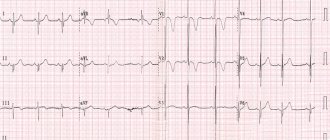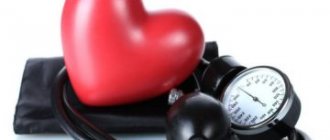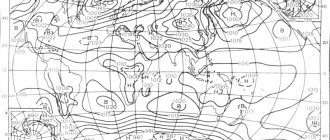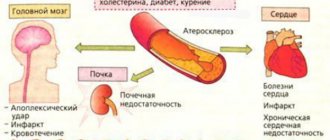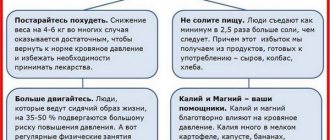Many people tend to attribute sudden attacks of headaches or general loss of energy to a change in weather. Patients with long-standing injuries often complain that before a thunderstorm, healed dislocations and fractures begin to hurt. According to WHO, about one third of the world's population believes that their well-being depends on weather conditions. But is this really so?
The International Classification of Diseases, which guides doctors when making diagnoses, does not include the terms “meteosensitivity” or “meteodependence.” Scientists and doctors continue to explore the relationship between weather events and exacerbation of chronic diseases.
What is weather sensitivity and weather dependence?
A person feels comfortable at a certain temperature, humidity and pressure. Changing any of these parameters can cause discomfort: for example, too dry air leads to drying of the mucous membrane of the nasopharynx, resulting in a cough. But the human body adapts well to various environmental changes: this explains why people in general tolerate changing climate zones and sudden changes in pressure that occur when taking off and landing an airplane or diving to depth.
The better developed the adaptive mechanisms of the body, the less a person pays attention to changes in temperature or pressure. Due to age-related changes, adaptation occurs worse; the situation is aggravated if there is a history of chronic diseases. A person does not become weather dependent, but his body adapts less well to changing weather.
Why do many patients believe that their well-being depends on weather changes? There are several reasons:
- self-hypnosis: the patient is sure that weather disasters affect his health, an additional stress factor arises, which “triggers” the exacerbation of a chronic disease;
- the tendency of people to connect different events: a person remembers attacks of illness longer if they occurred simultaneously with weather changes. Such episodes are stored in memory, and gradually a feeling of a relationship between the disease and the weather arises.
But doctors do not deny that a sharp increase or decrease in temperature can be dangerous in itself. For example, summer heat often leads to sunstroke and heatstroke, and winter cold coupled with physical activity increases the risk of heart attack. But weather change in itself does not affect either the physical or mental health of people.
Can weather affect health and well-being?
If a person does not have chronic diseases and adheres to a healthy lifestyle, a change in weather cannot affect his well-being. But prolonged rains, gloomy skies and lack of sunlight for several days can cause a decline in activity and affect the psycho-emotional state. From a physiological point of view, this is due to a slowdown in certain metabolic processes: for example, a decrease in the production of vitamin D.
If there is no confirmed scientific data on people's weather dependence, why is such a large percentage of the population confident that worsening weather affects their well-being? Typically, symptoms of meteosensitivity include:
- headaches and dizziness;
- decreased activity level;
- drowsiness or, conversely, insomnia;
- change in appetite;
- increased fatigue;
- sudden mood swings;
- apathy.
These signs can indicate a wide range of pathologies: from low levels of hemoglobin in the blood to diseases of the cardiovascular system. If you think your body is reacting to the elements, it's worth scheduling a preventive health checkup. Most likely, the doctor will determine the physiological cause of poor health.
To make a diagnosis, you will need to undergo an examination and a number of studies: for example, take general urine and blood tests, check biochemistry, and hormone levels. Often, “meteosensitivity” hides hormonal disorders. After the examinations, the doctor will make an accurate diagnosis, select treatment if necessary, adjust the diet, and develop preventive measures to maintain high vitality in any circumstances.
Why does the pressure “jump”?
One of the myths of “meteosensitivity” is associated with the opinion that blood pressure depends on weather fluctuations and magnetic storms. In fact, scientists have not found any relationship between these events. Blood pressure can indeed change due to external changes, but only under extreme conditions, for example, when climbing mountains.
Moreover, cardiologists say that the increase in blood pressure itself should not cause any inconvenience to a person. Problems begin only if the patient already has diseases of the cardiovascular system. The only exception to this rule: a hypertensive crisis, in which blood pressure becomes so high that the patient begins to experience nausea, chest pain, and shortness of breath.
What reasons actually lead to changes in blood pressure?
- alcohol poisoning. “Hangover syndrome” is usually accompanied by high blood pressure - alcohol breakdown products cause cerebral vascular spasm;
- uncontrolled medication use. Some popular over-the-counter painkillers can cause blood pressure spikes. Before using any pharmacological drugs, you should consult a qualified physician. If you suffer from attacks of pain, painkillers should be prescribed by your GP;
- high level of stress. Psycho-emotional overload is one of the main risk factors for cardiovascular diseases. Cardiologists pay so much attention to mental hygiene and strongly encourage their patients to reduce their stress levels as much as possible.
“Jumps” in blood pressure often indicate the presence of some problems: for example, cervical osteochondrosis or kidney inflammation. If there are signs of frequent changes in pressure, you must make an appointment at a medical center, undergo appropriate examinations and determine their cause.
High blood pressure in the summer heat. How to escape?
Too much heat quickly turns into autumn slush, puddles and rain, and then frost is not far away. And every year this picture goes in circles, causing more and more difficulties for people. People who have a history of persistently impaired blood pressure especially suffer from such changes in temperature. And while the vast majority of people know how to provide first aid to hypertensive patients, with hypotensive patients it is not so simple.
In some cases, they themselves do not understand what needs to be done to increase blood pressure, which has decreased due to the heat. For example, can I drink a cup of strong coffee, or is it better to take a medication prescribed by a doctor?
The ideal blood pressure for any person is 120/80; 110/60 is considered acceptable. If the bar drops a few millimeters of mercury lower, then consultation with a doctor is necessary.
Due to low pressure, the full functioning of internal organs is disrupted, neurocircular dystonia, endocrine disorders, and adrenal cortex deficiency may occur. Therefore, it is necessary to find out why blood pressure drops in the heat? What to do in such a situation, and which medications increase blood pressure, tells the edstar portal.
Why does blood pressure drop in hot weather?
High air temperatures are poorly tolerated by many people. It is the hardest for hypertensive and hypotensive patients. For the first, these are upward pressure surges, accompanied by a whole range of negative symptoms. In general, the best climate for hypertensive patients does not involve heat.
And in hypotensive people, blood pressure drops sharply, which leads to weakness, tinnitus, clouding of consciousness, severe headache, pain in the heart, nausea and other negative symptoms.
As medical practice shows, blood pressure often drops due to temperature changes, in particular in hot weather and extreme cold.
If a healthy person feels slight discomfort in the heat, and maybe there is no deterioration in health at all, then with hypertension the person will suffer and suffer until the weather conditions become acceptable for him.
Signs of low pressure in hot weather:
— Frustration, apathy, unreasonable fatigue. - Nausea, maybe vomiting. — My temples and the back of my head hurt. - It’s difficult to breathe, there seems to be not enough air, resulting in a state of panic. — Increased sweating, impaired visual perception, numbness of the hands. - Increased irritability, absent-mindedness. Sometimes there may be fainting.
This entire clinical picture characterizes the condition of hypotension. And with a sharp decrease in blood pressure, it is necessary to raise it by all available means, since complications of this condition can be serious and life-threatening. Against the background of heat, blood viscosity increases, vascular walls lose their tone, the human body lacks oxygen, and adaptation mechanisms decrease - this is why blood pressure decreases in the heat.
What to do if you have low blood pressure?
It is worth saying right away that the treatment of arterial hypertension and hypotension should always be comprehensive. Therapy involves a healthy diet (consuming only approved foods), optimal physical activity (cycling, swimming), and regular medication.
If the pressure has dropped slightly, a hypertensive person can drink one cup of coffee, but no more. Since this drink in large quantities negatively affects the functioning of the cardiovascular system.
It is recommended to breathe from your belly throughout the day. Why is that? Doctors say that one of the reasons for the decrease in pressure is pinching of some part of the vascular system due to muscle tension.
Therefore, if you do breathing exercises using slow deep breaths and exhalations, this will help relax the muscle corset and blood pressure will increase.
Tips for hypotension in the heat:
Drink 250 ml of regular still water every 80-90 minutes. If the blood is too thick, the blood pressure becomes lower as it moves slowly through the blood vessels, so you need to drink as much water as possible to increase the viscosity of the blood.
A contrast shower lowers blood pressure. This simple measure is suitable not only for hypotensive patients, but also for hypertensive patients. Contrast water procedures increase the tone of the vascular walls, resulting in normalization of blood pressure.
Instead of coffee, drink a refreshing juice. Definitely, coffee can increase blood pressure as quickly as possible, but if the cause of the heat is neurocircular dystonia, then caffeine, once in the body, will lower the pressure even more.
Massaging blood vessels. During the heat, the human body lacks oxygen, and the vascular walls lose their tone. Walking will help increase blood pressure, since during movement not only the muscles of the lower extremities work, but also the fibers of blood vessels.
If the day promises to be hot, then immediately after sleep you can take this “drink”: add 10 drops of eleutherococcus to a glass, or ginseng tincture, take on an empty stomach. Duration 2-4 weeks.
For hypotension, diet is important, since not only the composition of the blood, but also the health of the vascular walls depends on the products. You need to include red caviar, liver, spices, various berries, vegetables, and seasonal fruits in your menu. Acupuncture can effectively cope with increased blood pressure. To do this, you need to press on a person’s biologically active points for 4-6 minutes.
As practice shows, after such manipulation the pressure normalizes, increasing to the usual level.
What to do if you have high blood pressure?
Heat with hypertension negatively affects a person, leading to serious disorders and disruptions in the functioning of the body. In hot weather, hypertensive patients should not self-medicate and if they feel unwell, they should visit a doctor.
All medications previously recommended by the doctor should always be with you. Be sure to always carry a small bottle of water with you. It is important to remember that you need to drink water wisely. Abuse of fluids can lead to swelling of the lower extremities and shortness of breath. And with low water consumption: blood viscosity will increase, the likelihood of blood clots will increase several times, as will the risk of developing a heart attack or stroke.
Speaking of water, it is assumed that all liquids are consumed: first courses, compote, juice, tea, mineral water, and so on.
Tips for hypertensive patients in hot weather:
— Don’t forget to take the necessary medications. — You can’t stay in the scorching sun for a long period of time. — Herbal medicinal tea (the mixture can be purchased at a pharmacy) will help reduce blood pressure. — In summer, it is recommended to wear light-colored clothes and be sure to wear a hat. — The ideal time for a walk is before 11:00 am and after 17:00 pm. — Avoid sudden changes in temperature. For example, you can take a cold shower after a hot street. — Eliminate any physical activity from your lifestyle. Walking should be slow and leisurely, it is better to choose shady places; and there’s no point in talking about playing sports in the sun - it’s strictly prohibited. - In addition, exclude alcoholic beverages, fried and smoked foods, and fatty foods from your diet. It is better to give preference to fresh juicy fruits, vegetables, and cool fruit drinks. Mandatory strict and targeted diet for hypertension.
In the summer, as a rule, if there is a high temperature outside, the doctor reviews the dosage of medications and the frequency of their administration in order to improve the patient’s quality of life in the summer.
In a number of situations, if a patient has increased blood viscosity due to arterial hypertension, blood thinners are necessarily recommended to prevent the formation of clots.
So, in order to survive the hot season, you need to follow the main recommendations and not rush anywhere. Do not engage in sports, enjoy moderate optimal exercise through swimming in a lake or river, pleasant walks in the evening and relaxing rest, watch your diet. All this will help you enjoy summer days without changes in blood pressure.
https://grodnonews.by/news/zdorove-i-krasota/vysokoe_davlenie_v_letnyuyu_zharu_kak_spastis.html
Why does arrhythmia sometimes worsen due to weather changes?
Despite the fact that a healthy person does not pay attention to changes in the weather, people with cardiovascular diseases react quite sharply to temperature changes. This is explained by a violation of the adaptive mechanism: chronic diseases of the heart and blood vessels weaken the body’s ability to adapt to changing environmental conditions. How does this happen?
For example, when the temperature rises (as happens in the summer heat), the vessels dilate, blood flows to the tissues and organs, which causes additional stress on the heart. Blood pressure may drop, causing symptoms such as dizziness, blurred vision, shortness of breath, and cold sweats. On hot days, people with chronic heart diseases, for example, those suffering from arrhythmia, are advised to spend as little time as possible outside, reduce physical activity, and drink more.
Cold also has a negative effect on cores. Vasoconstriction increases the load on the heart muscle, and blood pressure rises. If the vascular tissue is weak (with atherosclerosis), there is a high risk of vessel rupture, aneurysm, heart attack or stroke.
But a much greater risk is created by self-hypnosis: if a person believes that weather anomalies affect his health, the level of stress increases significantly. The heartbeat increases, the arrhythmia worsens. Its main symptoms appear:
- feeling of “interruptions” in the chest;
- chest pain;
- dyspnea;
- dizziness;
- loss of consciousness.
Taking natural sedatives and calm, deep breathing helps relieve anxiety. But in order to keep arrhythmia under control, it is necessary to undergo regular examinations with a cardiologist. The doctor will develop recommendations that will help weather-sensitive people cope with magnetic storms and other anomalies. Their influence can be compensated with the help of healthy lifestyle rules and medications.
Arterial hypertension - features
The disease can be completely asymptomatic, then the person is not aware of the presence of high blood pressure. But in the absence of symptoms, the risk of complications is just as high as with negative symptoms (headache, dizziness, nausea, vomiting, etc.)!
An advanced condition means a high risk of stroke and heart attack, which can lead to disability and even death (according to WHO, death from cardiovascular pathologies ranks first in the world). The early stage of the disease, controlled by measuring blood pressure and taking special antihypertensive drugs, vitamin complexes and natural dietary supplements for the heart and blood vessels, is reversible, in contrast to advanced forms of the disease, which are dangerous to health and life.
The home medicine cabinet must contain first aid for a hypertensive crisis and antihypertensive drugs for regular use if a diagnosis of arterial hypertension is made. If your condition worsens, when your blood pressure rises sharply and suddenly, there is no way to urgently run to the pharmacy or see a doctor. Medicines for hypertension should always be available! Buy quality medications at affordable prices in Stolichka pharmacies.
Why do I get headaches when the weather changes?
Weather sensitivity is not an official diagnosis or disease: a healthy body normally tolerates any weather changes. If you notice that in cloudy weather you suffer from dizziness and headaches, this is an alarming signal indicating that pathological processes are occurring in your body. It is recommended to make an appointment with a neurologist or cardiologist.
Typically, headaches when the weather changes occur due to impaired vascular tone. Inside the skull, its own pressure is established (intracranial), the maintenance of which is important for the normal nutrition of brain cells. If vascular tone is disturbed (as, for example, with cervical osteochondrosis), a change in ambient temperature can provoke severe pain.
The mechanism of its development is as follows: temperature or pressure changes, in order to adapt to these changes, the vessels in the human body narrow or expand. But if their tone is disturbed, there are plaques on the walls or other pathologies are observed, this leads to circulatory disorders and changes in intracranial pressure. As a result, the patient may experience different types of headaches: from a “cotton-like sensation” to throbbing in the temples or migraine.
Pain can also be caused by an electrolyte imbalance. For example, if the air becomes humid, fluid accumulates in the body, which leads to an imbalance and can cause headaches. What to do in such cases?
To stop depending on weather changes, it is necessary to cure the disease: cope with osteochondrosis, restore vascular tone. To do this, you first need to understand why the body reacts sharply to temperature fluctuations. You can do this by making an appointment with a cardiologist or therapist at a medical center.
Atmospheric pressure fluctuations and well-being
These days, sharp changes in atmospheric pressure are observed on the European territory of Russia.
Last weekend, as the North Atlantic cyclone passed through the center of the country, the atmospheric pressure dropped sharply. And at the beginning of this week, the cyclone replaced the anticyclone, the atmospheric pressure on Tuesday will rise sharply and will remain elevated for several days. In the second half of the week, another North Atlantic cyclone will pass through the north of EPR. Sharp rises and falls in atmospheric pressure are again expected with it.
With a noticeable change in atmospheric pressure, both downward and upward, the human body often feels a deterioration in well-being. Here are some generally accepted recommendations from the website for reducing the negative symptoms of high or low atmospheric pressure on our body.
Anticyclone An anticyclone is an increase in atmospheric pressure, which is accompanied by calm, clear weather with no sudden changes in temperature or humidity levels. Increased atmospheric pressure has a very negative effect on human health, especially if he is allergic, asthmatic or suffers from high blood pressure. Such people react quite sharply to various harmful impurities in the air, the number of which increases significantly in dry, windless weather.
In the human body, an anticyclone manifests itself as headaches and heart pain, decreased performance, malaise and general weakness. Increased atmospheric pressure negatively affects the body's protective functions by reducing the number of leukocytes in the blood. All this significantly undermines human health, making him vulnerable to various infectious diseases.
In order to facilitate the effect of the anticyclone, it is recommended to take a contrasting invigorating shower in the morning, do light exercises and introduce more fruits containing potassium into your daily diet. To reduce the load on a person’s immune and nervous systems, it is better to temporarily abandon serious and important matters. If possible, it is necessary to rest more in order to quickly restore the strength lost by the body in the fight against the negative influence of the anticyclone.
Cyclone A cyclone is a decrease in atmospheric pressure, which is usually accompanied by increased temperature, cloudiness, humidity and precipitation. People suffering from low blood pressure, respiratory problems, and cardiovascular problems are most susceptible to the effects of the cyclone. The main manifestations of the negative impact of a cyclone on the human body are: difficulty breathing, shortness of breath, lack of air and general weakness. This is due to a lack of oxygen in the surrounding air. Often during a cyclone, a person’s intracranial pressure increases, resulting in a severe migraine. In addition, there may be disruptions in the functioning of the stomach and intestines, which are associated with intense gas formation. With the arrival of a cyclone, it is necessary to constantly monitor your blood pressure levels. Drinking plenty of fluids, a contrast shower, a restful, sound sleep, and a morning cup of coffee will help you with this. To maintain general health during periods of low atmospheric pressure, it is recommended to drink tincture of lemongrass or ginseng.
Rules for reducing symptoms of weather dependence Atmospheric pressure, or rather its sharp changes, more often take residents of megacities by surprise. It is almost impossible to completely cure this form of weather dependence, but by following some simple rules, you can significantly improve your health in difficult weather conditions. First of all, you need to strictly monitor your daily routine and go to bed earlier if possible. In case of sudden changes in atmospheric pressure, sleep should last at least 9 hours. For a good night's rest, it is recommended to drink a glass of chamomile or mint tea at night, and when you wake up, do a light massage of your legs and feet, and only then get out of bed. In order to cheer up, you should do daily short exercises, which will help tone your blood vessels. It is necessary to exclude bending and squats from the list of gymnastic exercises, as they require balance. After charging, it is recommended to take a contrast shower, which has a positive effect on the health of all internal systems and human organs.
A complex of vitamins, which should be taken during changes in atmospheric pressure, will help to support the nervous system well. You need to eat often, but in small portions, and in no case overload your body with heavy food. While working at the computer for many hours, you need to periodically take a break, during which you can do short exercises, change your position, and also do a massage of the cervical and temporal zones yourself. In order to endure all weather surprises as painlessly as possible, try to avoid severe overexertion and stress. It is also not recommended to carry out strength training and responsible activities at this time. In case of pressure changes, it will be useful to visit the pool, where the calm atmosphere and healing effects of water will help you forget about all the troubles.
Weather-sensitive people are advised to increase their consumption of water and fruit juices. If there are changes in blood pressure, you should rest more in a lying position. Sweet warm tea will help restore tone to the body with low blood pressure. During these difficult days, it is very important to notice in time the alarming signs that may indicate serious illnesses: - unpleasant sensations in the chest, radiating to the shoulder, shoulder blade or umbilical region; - sudden loss of sensation in the lower and upper extremities; - feeling of numbness in half of the face; - difficulty speaking; - unexpected attack of nausea; - blurred vision or flickering of spots before the eyes; - breathing problems.
We wish you vigor and good health, regardless of the level of atmospheric pressure!
What heart problems can arise due to weather changes?
Changes in weather cannot disrupt the functioning of a healthy heart, but can cause an exacerbation of chronic cardiovascular diseases. Doctors identify two main types of weather that are dangerous for heart patients:
- spastic: characterized by an increase in air pressure with a simultaneous decrease in temperature. This can lead to exacerbations of hypertension, angina, and coronary heart disease. Many patients complain of severe headaches due to vascular spasms;
- hypoxic: characterized by a decrease in pressure at high temperatures. Such weather is easier for patients with chronic heart disease, and there is less risk of stroke, heart attack or hypertensive crisis. But at the same time, shortness of breath and dizziness may develop, since the concentration of oxygen in the air decreases, and mild symptoms of hypoxia occur. Even healthy people may feel more lethargic and sleepy.
How to survive sudden changes in air temperature
As a rule, at a young age and in those who do not have chronic pathologies, a sharp jump in the temperature background is practically not felt. Health problems may occur in older people, as well as those with a history of chronic diseases and weather sensitivity. They may experience increased blood pressure, aching joints, headaches and even insomnia.
First of all, patients with arterial hypertension, especially if it is poorly controlled. Sudden changes in air temperature can provoke both a slight increase in blood pressure and a hypertensive crisis. People with coronary heart disease may experience an attack of angina. Vasospasm can provoke a headache, cause discomfort in the chest, and stabbing pain in the heart. Due to age-related changes or disorders caused by diseases, the body simply does not have time to adapt in time, which leads to such conditions.
The functioning of the circulatory system of our body is affected by atmospheric pressure. When it increases, blood pressure drops and heart rate increases. When barometric pressure decreases, arterial pressure, on the contrary, increases. By the way, people with cardiovascular diseases are most adversely affected by sudden warming (the heart rate increases, fainting and attacks of heart pain may occur).
A sharp change in temperature also has a bad effect on those who suffer from diabetes, diseases of the musculoskeletal system, nervous disorders and hormonal disorders.
For example, with a sharp cold snap, older people with rheumatism, osteoporosis, or rheumatoid arthritis begin to “twist” their bones and joints, and aching pain may appear in the areas of old fractures and injuries.
People with thyroid problems begin to feel cold all the time. A sudden change in weather also affects the nervous system. Drowsiness or, conversely, insomnia may appear, as well as a feeling of anxiety, although there are no apparent reasons for this.
In case of cardiovascular pathology, especially arterial hypertension, with a sharp change in temperature, you should monitor your blood pressure and be sure to take medications prescribed by your doctor.
If you know that you react poorly to changes in air temperature and weather, try to adhere to the following rules.
Get plenty of rest and sleep. Be sure to ventilate the room.
Don't forget about physical activity. It strengthens the immune system, accelerates metabolism, normalizes blood circulation (for example, walk more often), and has a positive effect on mood.
Eat well. You should not indulge in “heavy foods” (meat dishes, strong tea or coffee, beans, peas). Give preference to dishes made from vegetables, fish, and herbs.
Monitor your diseases (regularly measure blood pressure, pulse rate and rhythm, blood glucose levels, etc.).
Follow all medical recommendations, do not cancel or add medications or their dosage yourself without consulting your doctor.
If you need to go outside, for example, from a warm room into the cold, do not do it suddenly.
Stand in the vestibule of the entrance, adapt and only then go out into the frosty air. Do not forget about a cane or other support for movement. With sudden warming or cold weather, there is a high probability of icy conditions, which means there is a high risk of falls and ice injuries. Don’t take risks, stay at home or ask relatives and neighbors to go buy groceries or necessary medicine. Share on social media networks
Prevention of heart disease for weather-sensitive people
If you consider yourself to be a weather-sensitive person, this means that hidden pathological processes are occurring in your body - a healthy body easily adapts to changing weather without any unpleasant consequences in the form of pain or shortness of breath. The first thing that is recommended to do is to be examined by a cardiologist.
It is also recommended to consult a specialist in order to receive professional recommendations on the prevention of heart disease during sudden temperature changes. To feel good at any time of the year, you should:
- to refuse from bad habits. Smoking and alcohol create additional stress on the cardiovascular system. Abuse of alcohol-containing drinks in the heat is especially dangerous: alcohol causes cerebral vasospasm, and hot, humid weather retains fluid in the body;
- Avoid fatty, salty and smoked foods. These foods can also retain excess water in the body, disrupting the balance of electrolytes, increasing the symptoms of heart disease and worsening a person’s overall well-being;
- to live an active lifestyle. Regular physical activity strengthens the immune system, improves muscle and vascular tone, promotes blood microcirculation, and strengthens the heart muscle. As a result, the body’s adaptive ability increases: the body “rebuilds” more easily under changes in temperature and pressure;
- spend more time in the fresh air. Deep breathing saturates the blood with oxygen and relaxes, relieves vascular spasm. As a result, weather changes are easier to bear and less likely to lead to unpleasant consequences.
It is also recommended that all persons suffering from cardiovascular diseases regularly take vitamin complexes to maintain normal heart function.
1
0
2
Article rating:
2.5 out of 5 based on 14 ratings
Author: Luchinin Mikhail Yakovlevich
Cardiologist. Highest category, candidate of medical sciences. Work experience 31 years.
Meteor dependence in osteochondrosis
If you know the symptoms of spinal disease, you can avoid complications and pain due to climate change.
Causes of exacerbation of osteochondrosis
With osteochondrosis, the functioning of the joints in the spine is disrupted and the cartilage tissue is deformed. According to statistics, 8 out of 10 people on the planet suffer from this disease. It has been established that the disease not only leads to back problems, but also causes rapid aging of the skin.
The main causes of exacerbation of the disease include:
- Changing of the climate. When the climate changes, atmospheric pressure affects the spine, increasing the load on it.
- back massage. Violation of the massage technique or the client’s concealment of information about the disease can lead to serious problems and worsen the person’s condition.
- Stress. During stress, the nutrition of the intervertebral discs is disrupted, which leads to an exacerbation of the disease.
- Alcohol. Alcohol blocks recovery processes in the human body.
- Menstruation. At the beginning of the cycle, a woman’s body has a very low level of estrogen, and it is responsible for the condition of bone tissue.
- Strong physical activity. It is better for people with osteochondrosis not to bend sharply, lift heavy loads, or take long steps when walking.
The influence of weather on osteochondrosis
Even those people who do not suffer from osteochondrosis experience a deterioration in their health when the weather changes, because changes in atmospheric pressure lead to changes in blood pressure inside the body. Changing weather conditions affect the appearance of back pain in patients in the neck or lumbar region, since people with osteochondrosis are more susceptible to weather dependence.
In people with cervical osteochondrosis
spine, pain worsens with hypothermia and sudden temperature changes. Most often this happens in the fall. For those suffering from a disease in the area of the shoulder blades or lower thoracic region, there is a deterioration in health in winter or summer. That is, in the midst of cold or heat. In spring and autumn, there is an improvement in well-being, because during these periods there are no sharp temperature changes.
Symptoms of osteochondrosis
The main symptom of exacerbation of the disease is back pain
immediately after waking up. When changing position, the discomfort intensifies. Also, increased pain is observed when sneezing, coughing, laughing, raising the head and sudden movements. The pain can be sharp and short-lived, or aching and dull. It may go away during the day, but then return again. If osteochondrosis is in the cervical region, pain occurs with a sudden change in head position: tilting or turning. You may also experience tinnitus and crunching in your joints.
Some people experience decreased sensation in their toes or cramping, frequent urination, or incontinence. Girls may experience menstrual irregularities.
How to eliminate the influence of weather
The following tips will help alleviate your condition with osteochondrosis and reduce the influence of weather:
- Spend more time in a warm room without air conditioning. To protect yourself from the cold, you need to wear a hat and hood and tie a scarf around your neck.
- If you experience pain in your temples, a simple massage will help. Place your thumb and forefinger on both sides of your temples and make circular movements from your ear towards your eye. The massage should be light and leisurely.
- Maintain an upright posture while sitting and throughout the day. Level posture is characterized by the fact that the back and head are on the same line. Raise your head, spread your shoulders and squeeze your shoulder blades together. Don't forget about your chest and stomach: lift your chest and pull your stomach in, tensing your abdominal muscles. Try to constantly maintain this position to achieve results.
- Try to eat a balanced diet. It is better to exclude sweets, salty foods, white bread and fatty foods during periods of exacerbation of the disease. First of all, refined sugar is excluded, as it leads to leaching of calcium from the bones. Try to eat more vegetables and fruits that contain vitamins C, E and B3. In addition to fruits and vegetables, fish, legumes, seafood, nuts, eggs and chicken will help diversify your diet. You can also use low-fat kefir, yogurt or cottage cheese.
- Watch your excess weight. Extra pounds increase the load on the spine.
- With osteochondrosis, it is important to sleep only on an orthopedic pillow and cover yourself with a warm blanket. You can go to bed in warm pajamas or take a heating pad to bed.
- Stay outside a warm room or in the cold as little as possible, do not sit on cold and damp ground or concrete slabs.
- If you have pain in the neck, do not turn your head sharply, so as not to create additional stress on the cervical spine.
Finally
If you follow all the recommendations for alleviating the symptoms of osteochondrosis, then you can live with it without deteriorating your quality of life. Staying warm most of the time, using a special pillow and massaging your temples will help relieve pain and continue to enjoy life. The weather affects the exacerbation of the disease, as the atmospheric pressure changes and the load on those parts where there are disorders in the joint tissues increases. During such periods, you can prevent the onset of pain and reschedule plans for another day, if possible, or dress warmer than usual. It is better to cancel training on such days and give preference to therapeutic exercises (physical therapy).
All these rules should be followed not only by patients with osteochondrosis, but also by healthy people to prevent the disease.
The spine is the foundation of our body, so it is necessary to monitor its health regularly. Author: K.M.N., Academician of the Russian Academy of Medical Sciences M.A. Bobyr

